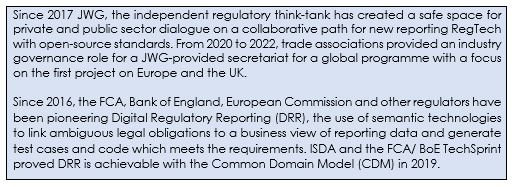As the deadlines for compliance with new, complex derivatives rules approach, many firms are at risk of facing hefty fines from regulators if they are found wanting.
JWG is calling on all firms to join their next global virtual seminar on 29 June to discuss strategies for deploying proven DRR RegTech to manage their regulatory reporting obligations.
Come learn about derivatives Reporting challenges and take advantage of this opportunity to learn from the experts how they plan to stay in control of their data.
Key messages:
- Don’t be fooled by the labelling of ‘rewrites or refit’, this is a complex and risky global change programme with regulators poised to assess quality and issue early fines
- Key laws are already on the books, leaving little time for deploying new code, engaging third parties and completing user acceptance testing
- All firms will need to agree their business requirements and get them signed off by the second line of defence, even if ISDA DRR code is deployed
- JWG’s DRR RegDelta will provide enriched regulatory documentation in your private cloud to streamline interpretation and regulatory decision workflow.
Join our next global virtual seminar on 29 June to hear how the leaders are deploying proven DRR RegTech to manage their regulatory reporting obligations.
Register for 29 June 2023 virtual pass
Why we rewrite
In 2009, G20 Leaders agreed that all over the counter (OTC) derivatives transactions should be reported to trade repositories (TRs) to improve transparency, mitigate systemic risk and prevent market abuse.
Aggregation of the data being reported across TRs will help Authorities obtain a comprehensive view of the OTC derivatives market and activity. Such aggregation is feasible only if standardisation and harmonisation of important data elements is completed.
In October, 2019 The CPMI and IOSCO Global regulators agreed to standardise the data elements in trade reports, include them in the ISO 20022 data dictionary and develop an ISO 20022-complliant CDE. Thanks to industry efforts, this was achieved in 2022 for the global implementation of the new standards.
As evidenced by the phased implementation in the US and elsewhere, this upgrade to common data is not without teething pains (see timeline below).
Some regulators have also specified that history be ‘backloaded’ into the new format meaning that entire books need to be transformed into formats that may not be compatible with current systems.
Complex, risky challenges
Not only do the ISO TR Auth 30 messages describe the business’ contractual events in a new way, they also identify the product by a new UPI code. The transaction identifier will also change with new logic for the generating party to implement. This means event and action type changes for current business flows.
In the US, the impact of this change was isolated to the large swaps reporting dealers which were able to leverage ISDA to deploy the Industry’s Common Domain model to create best practices. This means that what was once a static spreadsheet can now be downloaded via code.
Europe will be a far greater challenge as it requires dual-sided reporting and the regime also covers Exchange Traded Derivatives – not within the purview of ISDA. This means that multiple trade associations will need to get aligned on the code in due course.
This is not a small ‘rewrite’. There are many new and revised data point changes including collateral and the introduction of roles and responsibilities. For EMIR 160 fields will change: 86 new ones and 74 modified.
Regulators have also prescribed specific data quality checks for the firm as well as the repositories which receive and validate the reports. Gigantic spreadsheets have been issued with thousands of rows of logic and hundreds of pages of new technical guidelines have been issued.
In April, ESMA issued a report on the quality and use of transaction data which includes EMIR and shares the latest update on its data quality dashboard. It concludes “ESMA expects to further increase its engagement with the NCAs on the issues identified through the DQI dashboard also considering the preparation for EMIR Refit go-live.”
Implementation timelines
Implementation will be tied to new industry best practices, but all firms will need to agree their business requirements and get the signed off by the second line of defence.
Leading firms are well down the track in their business analysis and the fine points of business requirements definition (BRDs) are being worked out now.
However, many of these requirements and testing scenarios will depend on detailed interpretation which may change as regulators clarify their expectations. Planning for implementation is very much a case of ‘hurry up’ and wait for the key decisions to be made by the industry, your businesses, legal and compliance, and technology.
Japanese firms will have 121 working days to test the new UPI codes thoroughly before they are first required on 1 April 2024. This will challenge delivery teams to get their six months of testing done over what is traditionally a challenging time of year due to year end code freezes for the rest of the world.
Financial institutions in Europe will need to beware of cross-boarder business as it will need to report the same action in different ways, with new data that aligns imperfectly with the old data. This will be a major headache for UK firms doing business on the Continent.
What deadlines, where
The OTC Derivatives reporting rewrite has an ambitious timetable. Hundreds of systems will need to be recalibrated to the new data schema and extensive testing completed well in advance.
This means that firms are already working to align US CFTC reporting which started to go live in December 2022 with the rest of the global implementation deadlines.
- United States: December 22 CFTC rewrite Phase 1; December 23 CFTC Phase 2
- Canada: December 23 implementation (expected)
- International: ANNA DSB UPI 16 Oct 2023
- Japan: 1 April 2024
- Europe: 29 April 2024 EMIR Refit Official Journal; MiFID/R 2H25
- Australia: October 2023, ASIC Phase 1; October 24 Phase 2
- Singapore: Q4 2024 MAS Go Live
- United Kingdom: 30 September 2024 UK EMIR Refit
- Hong Kong: Q3 24 HKMA (expected)
The role of DRR
Regulatory reporting is an obvious target for RegTech/SupTech collaboration which JWG has played a key role in since 2015 see below.
JWG and DRR

ISDA is now carrying forward the work of the 2020-2022 JWG Global Derivatives DRR programme and announced an initiative to enable all firms to implement regulatory reporting rules consistently using the open-source Common Domain Model (CDM) which is managed by FINOS, the Fintech Open Source Foundation here.
ISDA, the FIA and buy-side associations like BVI, The Investment Association and EFAMA will run reporting working groups to align on best practices and direct updates to the CDM as required. This means that DRR code and test packs will be available for industry members to use as part of their reporting journey.
However, the code does not come with auditable links to text, explanatory materials and a streamlined way of staying up to date with developments. This is where JWG DRR RegDelta comes in.
JWG DRR RegDelta
Whether you plan to use the ISDA DRR code or not, the need for transparency, auditability and cross-jurisdictional analysis and collaboration has never been higher.
After being at the forefront of the Derivatives community reporting needs for years we are excited to announce that our award-winning DRR RegDelta platform is now live.
JWG analysts provide enriched regulatory documentation in your private cloud to streamline your interpretation and provide an audit trail of your regulatory decisions.
Forget spreadsheets, our NLP-driven workflow captures your needs with a straightforward review process and comprehensive audit trail.
Check out this 2-minute video for an overview of the JWG DRR RegDelta solution.
Join us 29 June 2023
At our next RegTech seminar on the 29th of June, leading SMEs will articulate the key regulatory and market reporting compliance challenges precipitated by divergent global policies.
We will be discussing how proven RegTech can be deployed now to help empower public and private sector alignment of interests.
Register for 29 June 2023 virtual pass
Please contact admin@regrisksolutions.com if you have any questions or would like to work with us.



